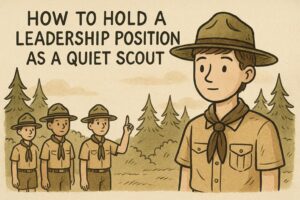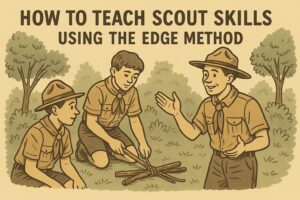In Scouts BSA, leadership is a requirement for advancement — especially when working toward Star, Life, and Eagle Scout. But not every Scout is loud, outgoing, or naturally commanding.
If you’re a quiet Scout, you might wonder: Can I really lead a patrol or serve in a troop position?
The answer is absolutely yes.
In this guide, we’ll show you how quiet Scouts can thrive in leadership roles, contribute meaningfully to their troop, and grow in confidence — without having to change who they are.
Want to learn more about the Leadership positions in Scouting? We have a complete guide to everything leadership position available in Scouting that you can find here.
Leadership Isn’t One-Size-Fits-All
Leadership in Scouting is not about being the loudest voice in the room. It’s about:
- Being responsible
- Setting a good example
- Helping others grow
- Following through on your commitments
Some of the best Scout leaders are quiet, thoughtful, dependable, and respectful — and those are exactly the qualities a troop needs.
Common Leadership Roles for Quiet Scouts
Here are a few troop positions that allow quiet Scouts to lead in a way that plays to their strengths:
1. Scribe
Keeps troop records, takes notes at meetings, and communicates information. Great for Scouts who are organized and detail-oriented.
2. Quartermaster
Manages gear and equipment. Perfect for Scouts who like logistics and making sure things are where they need to be.
3. Instructor
Teaches specific skills (like knots, fire building, or first aid) to other Scouts. Allows for one-on-one leadership and quiet confidence.
4. Librarian
Manages merit badge books and troop literature. Great for Scouts who enjoy being helpful without needing to speak in front of large groups.
5. Chaplain Aide
Leads reflections and supports the spiritual aspect of Scouting. Ideal for thoughtful Scouts who want to encourage kindness and respect.
Quiet Scouts can also thrive in Patrol Leader, Troop Guide, or even Senior Patrol Leader roles with the right support and approach.
Leadership Tips for Quiet Scouts
1. Lead by Example
Your actions matter more than your volume. Show up on time, wear your uniform properly, and complete your responsibilities without needing to be reminded.
2. Build 1-on-1 Connections
You don’t have to address the whole troop. Talk to Scouts one-on-one. Ask if they need help. Listen. These small interactions build trust and influence.
3. Use Written and Digital Communication
If speaking up is difficult, use tools like troop emails, group chats, or sign-up sheets to organize and lead effectively without always needing to speak aloud.
4. Prepare What You Want to Say
Write out announcements, meeting agendas, or activity instructions ahead of time. Practicing builds confidence and helps reduce stress.
5. Work with Your Patrol or SPL
If you’re in a leadership role but feel overwhelmed, ask your Senior Patrol Leader (SPL), Scoutmaster, or fellow leaders for support. Leadership is a team effort.
What Leadership Doesn’t Require
- You don’t need to be the loudest voice.
- You don’t have to give speeches every week.
- You don’t need to “boss people around.”
You just need to show commitment, responsibility, and care for your troop and your role.
Encouragement for Quiet Scouts
Many people assume that leadership means being naturally confident and extroverted — but in reality, great leaders come in all personalities.
In fact, some of the most respected leaders in the world — from scientists to CEOs — are introverts. What sets them apart is not how loudly they speak, but how reliably they act.
In your troop, being the quiet Scout who always follows through, supports others, and leads with humility can have a powerful impact.
If you’re feeling unsure about stepping into a position, start small, lean on your strengths, and give yourself permission to lead in your own way.
Final Thoughts
If you’re a quiet Scout, you can be a great leader — not by trying to be someone you’re not, but by embracing the strengths that make you unique.
Scouting is about growth, service, and responsibility. Whether you’re managing gear, helping a younger Scout earn a badge, or quietly guiding your patrol through a tough hike, you are leading.
So step up. You’ve got this.




